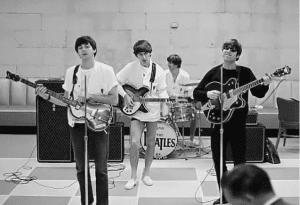The 5 Greatest Riffs From Ronnie Wood

Ronnie Wood for the Mad Lad music video - Ronnie Wood / Youtube
We may know him as the Rolling Stones’ ever-dependent second guitarist next to Keith Richards, but Ronnie Wood has long established himself to be one of the greatest axemen in rock history. Even before The Faces, a rock band that rose from the ashes of his former band Small Faces, he had already established his mettle. Mind you, he is the one who convinced the group to pick the then-unknown Rod Stewart, to whom he remained close throughout their entire career. Without further ado, let’s listen to these 5 greatest riffs that are crucial to know from this man of the hour.
“Just One Kiss” (2021) – Imelda May & Noel Gallagher
“It’s about that moment you know it can go either way,” Imelda May spoke about the meaning behind “Just One Kiss.” Wood flares up the song with his stifling guitar licks that make May and Noel Gallagher’s voices sound sexy. May also liked how “joyous” Wood can be in the studio. “He’s fast, really on the ball, and he knows intuitively when something is working,” she further said.
“What You Wanna Go And Do A Thing Like That For” (2010) – Ronnie Wood
One of Wood’s best vocal lines may be heard in one of the musician’s solo efforts. The guitar hooks were truly taken into account; when it starts as a simple, rhythmic hook, it quickly transforms into something much larger and much more appreciative of the London’s burgeoning style he once adored.
“Stay With Me” (1971) – Faces
“Stay with Me” served as the band’s only main hit, and what’s not to like about it? Incredibly passionate vocals from the ever-charismatic Stewart, paired with Wood’s fiery and ardent guitar-playing could make any song about one-night stands so dreamy.
“Beast of Burden” (1978) – The Rolling Stones
This sorrowful song showcases some of the band’s most accomplished guitar collaboration skills of both Richards and Wood inside the group. That’s not to say that one only imitates the other; instead, both exhibit different styles. But the compatibility of both guitarists’ talents made sense completely.
“Maggie May” (1971) – Rod Stewart
His work with Rod Stewart demonstrates a player who is capable of leading a band all by himself and doing it well. He was responsible for playing the bass and guitar for “Maggie May,” Stewart’s quintessential hit. All these talks about him being a second-best guitarist is pure baloney.
















